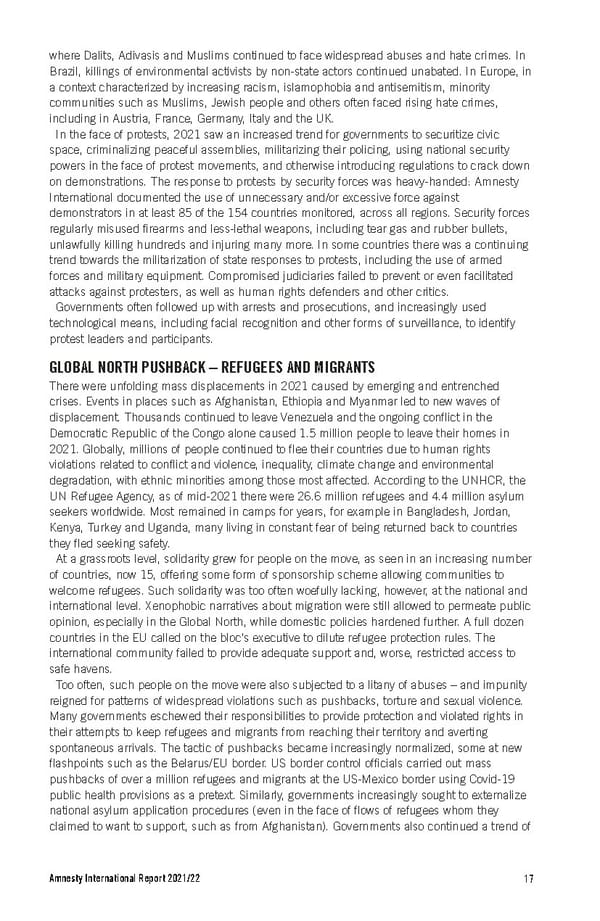where Dalits, Adivasis and Muslims continued to face widespread abuses and hate crimes. In Brazil, killings of environmental activists by non-state actors continued unabated. In Europe, in a context characterized by increasing racism, islamophobia and antisemitism, minority communities such as Muslims, Jewish people and others often faced rising hate crimes, including in Austria, France, Germany, Italy and the UK. In the face of protests, 2021 saw an increased trend for governments to securitize civic space, criminalizing peaceful assemblies, militarizing their policing, using national security powers in the face of protest movements, and otherwise introducing regulations to crack down on demonstrations. The response to protests by security forces was heavy-handed: Amnesty International documented the use of unnecessary and/or excessive force against demonstrators in at least 85 of the 154 countries monitored, across all regions. Security forces regularly misused firearms and less-lethal weapons, including tear gas and rubber bullets, unlawfully killing hundreds and injuring many more. In some countries there was a continuing trend towards the militarization of state responses to protests, including the use of armed forces and military equipment. Compromised judiciaries failed to prevent or even facilitated attacks against protesters, as well as human rights defenders and other critics. Governments often followed up with arrests and prosecutions, and increasingly used technological means, including facial recognition and other forms of surveillance, to identify protest leaders and participants. GLOBAL NORTH PUSHBACK – REFUGEES AND MIGRANTS There were unfolding mass displacements in 2021 caused by emerging and entrenched crises. Events in places such as Afghanistan, Ethiopia and Myanmar led to new waves of displacement. Thousands continued to leave Venezuela and the ongoing conflict in the Democratic Republic of the Congo alone caused 1.5 million people to leave their homes in 2021. Globally, millions of people continued to flee their countries due to human rights violations related to conflict and violence, inequality, climate change and environmental degradation, with ethnic minorities among those most affected. According to the UNHCR, the UN Refugee Agency, as of mid-2021 there were 26.6 million refugees and 4.4 million asylum seekers worldwide. Most remained in camps for years, for example in Bangladesh, Jordan, Kenya, Turkey and Uganda, many living in constant fear of being returned back to countries they fled seeking safety. At a grassroots level, solidarity grew for people on the move, as seen in an increasing number of countries, now 15, offering some form of sponsorship scheme allowing communities to welcome refugees. Such solidarity was too often woefully lacking, however, at the national and international level. Xenophobic narratives about migration were still allowed to permeate public opinion, especially in the Global North, while domestic policies hardened further. A full dozen countries in the EU called on the bloc’s executive to dilute refugee protection rules. The international community failed to provide adequate support and, worse, restricted access to safe havens. Too often, such people on the move were also subjected to a litany of abuses – and impunity reigned for patterns of widespread violations such as pushbacks, torture and sexual violence. Many governments eschewed their responsibilities to provide protection and violated rights in their attempts to keep refugees and migrants from reaching their territory and averting spontaneous arrivals. The tactic of pushbacks became increasingly normalized, some at new flashpoints such as the Belarus/EU border. US border control officials carried out mass pushbacks of over a million refugees and migrants at the US-Mexico border using Covid-19 public health provisions as a pretext. Similarly, governments increasingly sought to externalize national asylum application procedures (even in the face of flows of refugees whom they claimed to want to support, such as from Afghanistan). Governments also continued a trend of Amnesty International Report 2021/22 17
 Amnesty International Report 2021/22 Page 16 Page 18
Amnesty International Report 2021/22 Page 16 Page 18